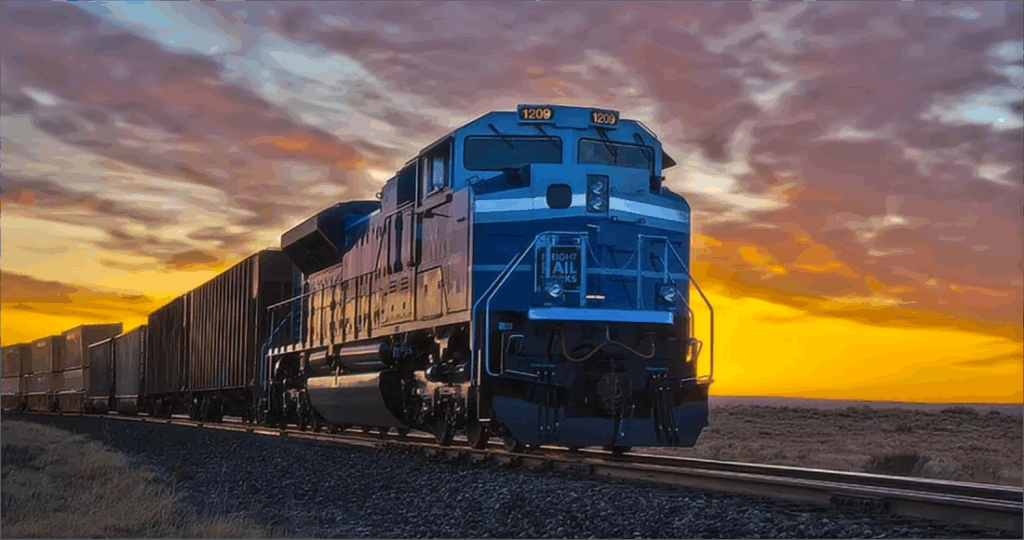- By TOP CHINA FREIGHT
- July 17, 2025
- Shipping
As trade relations between China and Russia continue to grow, rail freight from China to Russia has become the dominant transportation mode for cross-border cargo. With shared borders, expanding infrastructure, and direct access to Eurasian corridors, rail offers unmatched efficiency, reliability, and affordability for businesses moving goods between these two neighboring economic powerhouses.
Whether you’re shipping electronics, industrial machinery, or consumer goods, this guide provides a detailed overview of routes, transit times, customs, pricing, and best practices for rail freight between China and Russia.

1.Why Choose Rail Freight from China to Russia?
Rail is the preferred method of transport for overland trade between China and Russia — and for good reason:
1.Fast & Reliable
- Transit time: 5–12 days (depending on origin/destination)
- Multiple direct services with daily or weekly departures
2.Cost-Effective
Rail freight is significantly cheaper than air freight and faster than ocean shipping via Vladivostok or other ports.
3.Seamless Connectivity
With a shared land border of over 4,000 km, there’s no sea or air bottleneck — allowing direct container-to-container movement.
4.Suited for All Cargo Sizes
Whether you need Full Container Load (FCL) or Less than Container Load (LCL), rail handles both effectively.
5.Fewer Border Delays
As members of the Eurasian Economic Union (EAEU) and strategic partners, China and Russia have streamlined customs processes along key corridors.
2.Main Rail Routes: China to Russia
China and Russia are connected via several border crossings and inland dry ports, offering multiple rail corridors based on origin and destination.
Major Border Crossings:
- Manzhouli – Zabaikalsk (most commonly used)
- Suifenhe – Grodekovo
- Erenhot – Zamyn-Uud – Naushki (via Mongolia)
Popular Origin Cities in China:
- Manzhouli
- Harbin
- Suzhou
- Chongqing
- Xi’an
- Chengdu
Key Russian Destinations:
- Moscow
- Saint Petersburg
- Yekaterinburg
- Novosibirsk
- Vladivostok
- Kazan
3.Transit Time from China to Russia
| Route | Estimated Transit Time |
|---|---|
| Xi’an → Moscow (via Manzhouli) | 10–12 days |
| Chongqing → Moscow | 10–14 days |
| Harbin → Vladivostok | 5–7 days |
| Suzhou → Yekaterinburg | 12–14 days |
Transit times may vary due to weather, customs, or capacity constraints.
4.Rail Freight Costs: China to Russia
Prices vary depending on cargo size, origin, and destination. Below are general estimates:
- FCL (Full Container Load):
$4,000–$6,500 per 40ft container - LCL (Less than Container Load):
$150–$200 per CBM
Rates fluctuate with demand, fuel prices, and geopolitical conditions. Request updated quotes from a licensed forwarder.
5.FCL vs. LCL: Which is Right for You?
| Feature | FCL (Full Container Load) | LCL (Less than Container Load) |
|---|---|---|
| Volume | 15+ CBM | 1–12 CBM |
| Handling | Exclusive use, safer | Shared space, more handling |
| Cost per unit | Lower | Higher |
| Best for | Medium–large shipments | Small, non-urgent cargo |
6.What Can Be Shipped by Rail to Russia?
Rail freight is ideal for a broad range of goods:
Common Rail Cargo:
- Electronics and machinery
- Consumer goods
- Chemicals and raw materials
- Automotive components
- Textiles and garments
- Construction materials
Restricted/Prohibited Items:
- Hazardous materials (without proper permits)
- Military or dual-use goods
- Sanctioned items
- Highly perishable goods (unless temperature-controlled)
7.Required Documents for Rail Freight to Russia
To ensure smooth cross-border transport, these documents are typically required:
- Commercial Invoice
- Packing List
- Rail Waybill (CIM)
- Certificate of Origin
- Contract/Proforma Invoice
- Customs Declaration (if applicable)
Tip: Work with a freight forwarder familiar with Russia’s customs system to avoid errors or delays.
8.Customs & Clearance: What to Expect
Russia uses the Eurasian Customs Union system (EAEU). Key considerations include:
Customs Duties:
- Based on cargo type and HS Code
- Usually calculated as a percentage of CIF (Cost + Insurance + Freight)
VAT:
- Standard VAT in Russia is 20%, applied on most imports
- Some industries or regions may qualify for exemptions
Tip: For streamlined entry, use door-to-door or DDP (Delivered Duty Paid) services, especially for high-value cargo.
9.Key Advantages of Rail Over Other Modes
| Mode | Transit Time | Cost | Best Use Case |
|---|---|---|---|
| Air | 3–5 days | $$$$ | Urgent goods |
| Rail | 5–12 days | $$$ | Time-sensitive, mid-sized cargo |
| Sea (via Vladivostok) | 25–40 days | $$ | Bulk, non-urgent goods |
Conclusion
Rail freight from China to Russia is a fast, cost-effective, and strategic solution for companies shipping a wide range of goods across Eurasia. With growing bilateral trade, investments in infrastructure, and expanded customs cooperation, rail will continue to dominate overland transport in the years ahead.
By choosing experienced freight forwarders and planning for peak-season disruptions, businesses can tap into one of the most reliable and scalable shipping options available .
Need a Shipping Quote?
Click below to get a free, no-obligation quote from TJ China Freight.
We’ll respond within 24 hours with the best shipping options for your cargo.
FAQ:
Q1:How often do trains run from China to Russia?
Daily or multiple departures per week depending on the route and origin.
Q2:How long does rail freight take to reach Moscow?
Typically 10 to 12 days from central China.
Q3:Can I ship construction materials by rail?
Yes. Rail is ideal for heavy industrial goods like cement, tiles, steel, and piping.
